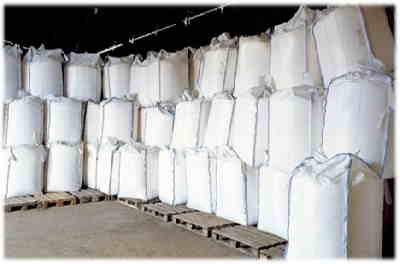Powder caking and Uni-axial compact strength testing
Uni-axial compact strength testing
Powder caking and Uni-axial compact strength testing methodologies Although caking is mostly observed for powders, also granular material can evidence of these caking phenomena, mostly caused by mechanical blockage since the number of surface contact points is considerably less compared to powders. For that reason, powder caking often has a different origin compared to caking of granular materials.
Storage of powder material in bulk quantities such as big bags and the subsequent stacking of big bags often changes the powder flow properties of materials and induces a powder caking phenomenon: a free-flowing material is transformed into a lumpy material with dramatically changed and quite often undesired flow behavior. The origin of such powder caking can be related to physical or mechanical blockage. However, also more complex phenomena like solid phase transitions and particle deformation, either elastic or plastic deformation, can be an underlying mechanism. Variables such as particle size distribution, interaction of the surface with moisture, and effect of time and temperature should be considered when studying the phenomenon of powder caking.
Uni-axial Compact Strength testing is a very suitable measurement methodology to study this caking phenomenon of powder or granular materials and detect changes in powder flow behavior due to compaction and confinement. These studies can be carried out over a wide range of consolidation pressures, for different durations, and under a variety of temperature and relative humidity conditions. In such powder caking study the material under investigation is exposed to certain consolidation conditions and afterwards the failure strength, i.e. the force to break up the formed unconfined powder cake, is determined. In this way, critical conditions for (preventing) caking from occurring can be identified and this information can be used to change the product formulation, the unit operation, or the storage conditions. This should then lead to an improved product quality since the product displays a more reliable powder flow behavior and powder caking is not taking place.
The uni-axial compact strength measurement methodology is also suitable for investigating the role of anti-caking agents or flowing agents on the powder products being studied. Anti-caking agents or flowing agents are added to many powdered products to minimize the powder-caking phenomenon and keep the powder flowing. The use of the uni-axial compact strength measurements can help to identify and optimize the concentration of flowing agents for optimal performance.





